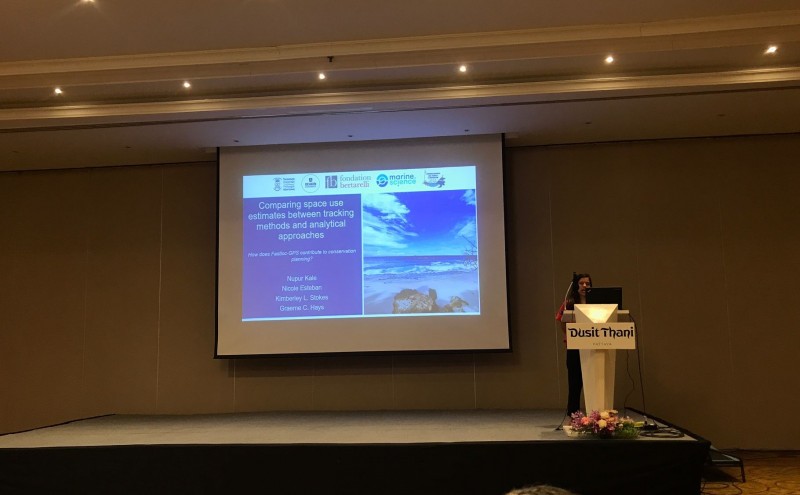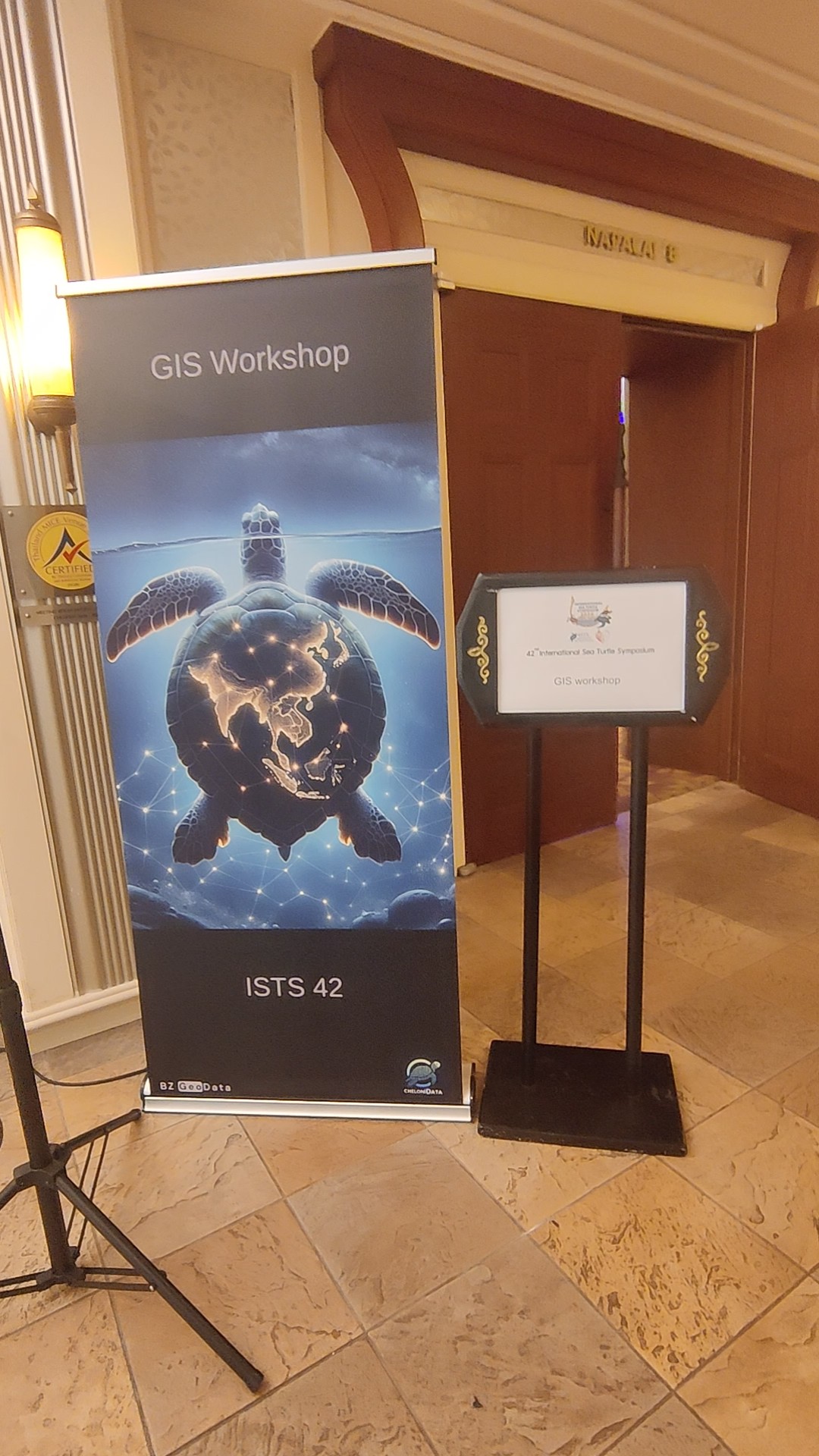The 42nd International Sea Turtle Symposium (ISTS), Pattaya, Thailand
Nupur Anil Kale
Swansea University

The 42nd International Sea Turtle Symposium (ISTS) was held from 24th March to 29th March 2024 in Pattaya, Thailand. The ISTS is an annual conference on sea turtle ecology and conservation, veterinary studies, policy, outreach etc. It provides a networking platform to students, early-career researchers, senior scientists, conservation practitioners, educators and other professionals involved in sea turtle research and conservation. The events at this year’s symposium included half and full-day capacity-building workshops, keynote addresses, talks and poster presentations, and regional meetings. Additionally, there were social events like student mixers, live auction, closing banquet etc. to facilitate further interactions between attendees. With the conference being hosted in Thailand, the focus of the symposium was to showcase sea turtle research and conservation activities in Asian countries, particularly in Southeast Asian countries like Thailand, Indonesia, Malaysia etc.

As I am in the second year of my PhD, the conference was the perfect opportunity to present my first study. My study titled ‘Comparing space-use estimates within tracking methods and analytical approaches’ was presented in a new session called Technology and Sea Turtles on 28 April 2024. The study investigates the presence of methodological noise introduced by tracking methods and analytical approaches used to derive space-use estimates. We used two approaches: 1) simulated data analysis, and 2) meta-analysis of published home range size estimates of hawksbill and green turtles to obtain space-use estimates. The home range size estimates were then compared using an analysis of variance (ANOVA) to test differences between different tracking methods and between analytical techniques. Our results showed that home range size estimates derived from Argos data were 100-10,000 times larger than those derived from high-accuracy Fastloc-GPS data. The differences in home range size estimates between analytical approaches were 2- to 10-fold but were not significant. Our findings indicate that tracking methods add more noise to space use estimates than analytical approaches. Based on the results, we recommend using high-accuracy data such as Fastloc-GPS data to study the fine-scale habitat use of animals including sea turtles. The audience appreciated the study results, and their questions gave me more opportunities to highlight the importance of our findings.
To gain the most from the conference, I opted to attend a workshop on GIS as it focussed on modelling techniques to study the movement and habitat use of sea turtles. Talks and poster presentations on topics such as nesting biology, population biology, education etc. gave an interesting insight into current research allowing me to explore new ideas for future research. I also joined the Indian Ocean and Southeast Asia (IOSEA) regional meeting to provide a brief overview of my research in the Western Indian Ocean to professionals from the region. At a meeting of the IUCN-SSC Marine Turtle Specialist Group (MTSG), I learnt about the updates to Regional Management Units (RMUs) along with other ongoing work by the group such as Burning Issues in sea turtle conservation. I also attended the student and welcome mixers to build connections and discuss potential collaborative opportunities with other PhD students, early-career researchers, and senior professionals.
I volunteered with the conference and student committee to assist with tasks such as manning the silent auction desk, registering attendees for the expert speed talks etc. On the last day of the conference, there was a business plenary where the details of the conference organisation were discussed. This session gave an insight into the administrative aspects of the conference and decision-making associated with the working of the International Sea Turtle Society and Symposium. Additionally, the location of the next symposium was announced (Ghana in 2025) and the new President of the Sea Turtle Society was introduced.
The conference was instrumental in not only improving my knowledge of research on sea turtles but also led to discussions on future collaborations with colleagues from the Western Indian Ocean region. It was also my first time giving a talk about my research and the presentation was useful in determining my strengths and weaknesses in public speaking. Finally, attendance at the conference would not have been possible without the support of the Challenger Society. I am grateful to the Challenger Society for the travel grant that allowed me to have this rewarding conference experience.
Profile
Nupur is a second-year Bioscience PhD student at Swansea University. Her research focuses on the spatial ecology of sea turtles in the Western Indian Ocean.
Latest News
Marine Data Management, Governance and the MEDIN toolset
The Marine Environmental Data and Information Network (MEDIN) and OceanWise are delighted to invite you to attend our popular free online training workshop: ‘Marine Data Management, Governance and the MEDIN toolset’ on the 19th – 23rd of May 2025.
Workshop on the contribution of UK Arctic Ocean science to the International Polar Year 32/33
12:00 11th June – 16:00 12th June 2025: NOC Southampton (In-person with online option): Registration deadline 16th May
REGISTER HERE
Pre-meeting questionnaire (open to all)
The purpose of this workshop is for the UK Ocean Science community to discuss and then draft a prospectus document outlining the priority Arctic research questions the community would like to address during the run up to, throughout and beyond the International Polar Year 32/33. Additionally, to identify what unique strengths and technologies the UK has to help fill these knowledge gaps.
The second day of the workshop will be dedicated to writing groups, one for each of the priority research questions identified - from both the pre-meeting questionnaire (HERE) and day one discussion. By the end of the meeting, each group will have produced draft text and sourced supporting figures for the prospectus.
Post meeting, the draft will be opened for comments and suggestions from everyone, regardless of whether they were able to attend the workshop or not. It will then be shared with UK funders (UKRI, FCDO, DSIT, ARIA) and potential international programmes with whom we would like to collaborate (e.g. Arctic 2050, Norway). It will form a basis from which wider integration with terrestrial, atmospheric and cryosphere communities can be built, e.g. at the UK Arctic Science Meeting in September in Northumbria.
To ensure balanced community and ECR representation, and to ensure that the size of the writing groups is efficient and effective, if the number of registrations from individual institutes becomes overwhelming, we may contact individuals or teams and ask that each institute selects a smaller number of individuals to attend in-person. Please wait for confirmation of in-person attendance before finalising travel arrangements.
The workshop will be open to hybrid attendance and contributions on both days.
Challenger Society Council Position Vacancy
The Challenger Society for Marine Science (CSMS) are pleased to announce an exciting opportunity to support the next generation of ocean scientists and innovators. CSMS are looking for a new Council member to fill the Student Travel Awards and Stepping Stones Portfolio. The successful applicant will administer the travel and research grants available for Early Career Researchers.
The role involves:
- Receiving applications for the two schemes and responding to applicant inquiries
- Soliciting and compiling input from the rest of the Council for assessing the applications
- Communicating with successful and unsuccessful applicants for the two schemes
- Working with the Honorary Treasurer on allocating funds to successful applicants
- Following up with award winners on their reporting requirements
- Attending Council meetings four times a year (in person or online) and contributing to discussions and decision making for CSMS
The usual term for Council members is three years.
For more information about the CSMS Council, please follow this link: https://www.challenger-society.org.uk/The_Council
For more information about our Early Career Researcher grants and awards, please follow this link:
https://www.challenger-society.org.uk/Stepping_Stones
and
https://www.challenger-society.org.uk/Travel_awards
If you are interested in applying or have any questions regarding the role, please contact kathen@bas.ac.uk
